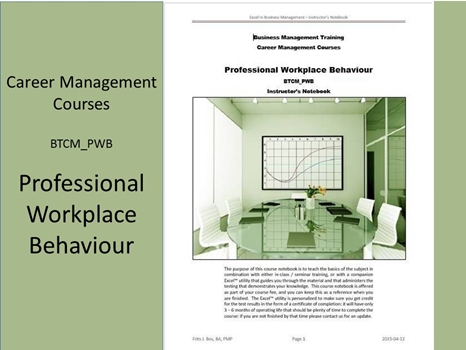
Professional Workplace Behaviour BTCM_PWB
The workplace has changed dramatically yet many people seem lost in terms of what behaviour is acceptable. We have seen the spectacle of well-known radio and TV personalities caught in a web of sexual harassment that besmirched individuals as well as the organizations they worked for. The key here is that people seemed to have lost their morals in the course of embracing the concepts of equality in the workplace. Many people treat this as a joke – they discover too late that destroying a career and a reputation tends to be final, no matter how clever a lawyer may be trying to diminish the serious nature of the interaction. Many lesser offenses can equally ruin a career when the outcome is a lack of trust – something that is extremely difficult to rebuild after the dust settles. The fact that the hero gets away with it in the movies seldom translates in the general acceptance of such behaviour in and out of the workplace.
What many people forget is that we are never truly on our own time when we are associated with a job – this is especially true for individuals that are in the public eye, and that are deemed to have used their public persona to indulge in otherwise inappropriate behaviour. Even if there is thought of people putting up with it, resentment builds: then all it takes is for one person to take a stand and the dam breaks. Most organizations cannot be seen to tolerate that behaviour and once their reputation is compromised the responsible individuals may see their careers fall from fame to infamy.
We live in a world surrounded by temptation, and we are conditioned to fall for temptation through commercials, movies, and social interaction at times. We see examples of how people appear to benefit by taking action in response to suggestion, not discounting the fact that most story lines tend to be awfully simplistic in order to get through to the audience, while we may forget that the people we look at are actors. In fact, actors tend to be most affected by the illusion of getting away with things that people in general would never attempt – their larger than life exploits make them targets for gossip magazines. When ordinary people adopt that kind of behaviour in response to perceived temptation it generally does not work out that well. It does not matter much what role you play – the temptress can do as much personal career damage as may be inflicted on the target. Always keep in mind that what happens in the movies is mostly fantasy.
Opportunity and power tend to go hand in hand – in other words, success can be a highway to trouble if you let your guard down. Many people see this in the narrowest of terms, generally in a sexual contact, but in reality it is a much broader exposure whether there is an overt attempt to force a situation or a covert effort to benefit indirectly. The more control can be exerted, the more risk is involved in trying to make use of an opportunity, and the more severe the consequences can be if that backfires. That does not mean people need to avoid any interaction with others, it means that any interaction has to be considered in the context of those involved. For a professor to chase students would clearly be unacceptable, but outside that context age difference of itself would not necessarily be a barrier if it involved a truly consensual friendship that does not affect marking tests. Always ask yourself why you should react to the opportunity and what the motivations might be that creates an opportunity you might better ignore.
However we react to opportunity is within our sphere of responsibility, so it is important that we develop a sense of what is appropriate and where to draw the line. It would seem reasonable to err on the side of caution: you can be friendly without being too friendly, and be helpful without any hint of being intrusive. If you are not sure about that, then avoid getting into situations of that nature. People need a supportive environment and social interaction, they are naturally drawn to it, but they have to assume responsibility for not getting carried away. Reputation is easier lost than it is developed, so there should never be any doubt about your intentions if you merely want to be supportive in a way that can easily be interpreted as coercive and unappreciated. If you even think a situation is developing that you are in any way uncomfortable with, speak up: if it is difficult to be assertive up front, speak up as soon as you are able to find a 3rd party.
The decisions we make are ours alone – there are no mitigating factors or social pressures that diminish accountability for behaviour. There may be legal wrestling that mitigates penalties for bad behaviour, but you cannot undo what has been done. Often social consequences are much worse than legal consequences – careers have been destroyed because one way or another people are held accountable for their actions. Even helping a person with the best of intentions can backfire if they do not appreciate that help, or if others comment about the perceived intentions that can be damaging to both parties involved. Especially where there is a perception of favoritism the grapevine is quick to receive and spread the news. What we see in the media are cases that may be 5, 10, even 20 years old: these can still come back to haunt you, but they also haunt the victim because it carries a stigma of not speaking up in a timely manner (even if the victim was young and unaware of the consequences at that time).
The bottom line is that we need a set of moral standards that keep us free from troubles simply by sticking to compliant behaviours. That does not mean an icy attitude towards those you work with – it means a strict limit on how much you push the envelope and/or how much you may tolerate. What people forget (as evidenced in the media) is that their employer is directly involved – even if the alleged behaviour takes place outside the workplace. Family and friends feel tainted by the behaviour even if they are not directly involved. The damage from ill-considered behaviour can spread far and wide, with serious potential consequences for those that are directly involved. It is important to understand that the infractions do not have to be physical – they can be verbal and/or emotional, threats or blackmail, overt or covert, private or even in social networks where there can be a huge potential damage to peoples’ reputation.
Learning Formats BTCM_PWB
This course is currently available in a classroom setting (public or company private) with approximately 15 contact hours.
PDF – Certificate Of Completion
Each course offers a certificate of completion that identifies the course, the student, and a brief description of the course. To receive a certificate the student must have attended at least 80% of the course sessions. This personalized certificate is forwarded to the student by Email.
PDF – Course Notebook
Each course includes a notebook in PDF format that provides the minimum knowledge the student must master in order to obtain the certificate. In the notebook you will find references to other study materials. Students receive the notebook by Email when their registration is confirmed.
PDF – Program Overview
An overview of this study program can be downloaded from the website by right-clicking on the program link on the enquiry page.
PDF – Current Training Schedule
A list of upcoming training sessions can be downloaded from the website by right-clicking on the schedule link on the enquiry page.
Registration – Service Providers
To register for any training course please look on the enquiry link page of your service provider (from where you accessed this website). On the page you will find a registration request form where you can order the course that you are interested in. The availability dates will be provided to you, along with payment instructions if you decide to go ahead.

 |
|